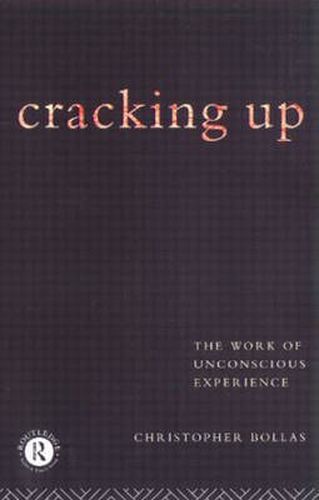Readings Newsletter
Become a Readings Member to make your shopping experience even easier.
Sign in or sign up for free!
You’re not far away from qualifying for FREE standard shipping within Australia
You’ve qualified for FREE standard shipping within Australia
The cart is loading…






In this elegantly written and often ironic collection of essays, Christopher Bollas continues his exploration of the inner world of human experience. He shows how we develop a separate sense - intuition - through unconscious processes of free association in which meaning is first condensed and then cracked up’, extending our ability to communicate with each other. This process occurs informally in our daily lives and formally in psychoanalysis, where it is brought to consciousness. He argues that an increase in our ability to use these already existing unconscious processes leads to an increase in unconscious freedom; in turn this leads to an increase in our capacity for creativity. Bollas also looks at those people, such as the obesessed or preoccupied, who cannot acheive unconscious freedom in this way, and at those so caught up in a pathological structure that they feel their lives are governed by a logic that seems to derive from factors external to the self. In a disturbing analysis of the serial killer he shows how this failure to develop an intuitive sense can arise and later result in a deeply traumatic conclusion.
$9.00 standard shipping within Australia
FREE standard shipping within Australia for orders over $100.00
Express & International shipping calculated at checkout
Stock availability can be subject to change without notice. We recommend calling the shop or contacting our online team to check availability of low stock items. Please see our Shopping Online page for more details.
In this elegantly written and often ironic collection of essays, Christopher Bollas continues his exploration of the inner world of human experience. He shows how we develop a separate sense - intuition - through unconscious processes of free association in which meaning is first condensed and then cracked up’, extending our ability to communicate with each other. This process occurs informally in our daily lives and formally in psychoanalysis, where it is brought to consciousness. He argues that an increase in our ability to use these already existing unconscious processes leads to an increase in unconscious freedom; in turn this leads to an increase in our capacity for creativity. Bollas also looks at those people, such as the obesessed or preoccupied, who cannot acheive unconscious freedom in this way, and at those so caught up in a pathological structure that they feel their lives are governed by a logic that seems to derive from factors external to the self. In a disturbing analysis of the serial killer he shows how this failure to develop an intuitive sense can arise and later result in a deeply traumatic conclusion.